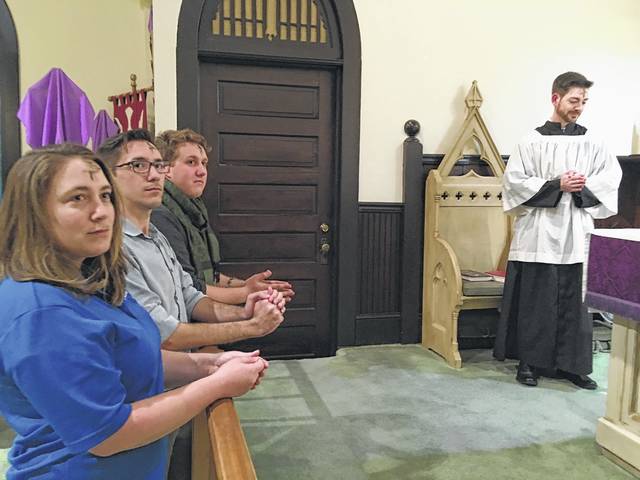HAMLET — Wednesday marked the end of Mardi Gras — French for “Fat Tuesday” — as Christians around the globe gathered in their churches for a solemn observance of the beginning of Lent.
Such was the case at All Saints Episcopal Church, where members and visitors alike celebrated Mass and received the sign of the cross traced in ashes on their foreheads.
Ash Wednesday takes place 46 days before Easter Day which, according to the Book of Common Prayer, “is always the Sunday after the full moon that occurs on or after the spring equinox on March 21.” The date of the spring equinox, for liturgical purposes, does not always correspond to the astronomical equinox. For this reason, Easter is not on a fixed date each year.
The mathematical calculations used to determine Easter Day may seem intimidating — but the meaning of Ash Wednesday is not. Harkening back to the Jewish penitential tradition of wearing ash and sackcloth as a sign of grief for the separation of God from man due to sin, the first day of Lent begins a yearly period of fasting and prayer that continues for 40 days (not counting Sundays, which are always set aside for the worship of God and for rest from labor).
For each person, Lent has a separate and personal significance, said Kathy Shelley of All Saints.
“It’s a time in which we are to reflect and repent, and really think about where our life is and where we want it to go, and where God fits into all of that,” she said. “It’s a time of study and prayer, and looking inward at yourself. Some people give things up as a discipline.”
Examples of giving things up can include refraining from something you ordinarily would enjoy, such as chocolate, candy and soft drinks, Shelley said.
“And other people add things,” she explained. “On our trip that we took this summer, we did daily evening prayers. And it was such a wonderful thing that Greg (Shelley, her husband) and I decided that as a couple we were going to have evening prayer every night and read the lessons. So we are adding this year instead of taking away.”
Shelley explained that the little children of the family also understand it — but in a childlike way.
“They know that this is the time we think about God,” she said.
Some churches have established and obligatory days of fasting during Lent, but Shelley said while it is an honorable custom, such days are not incumbent upon Episcopalians.
“We’ve evolved, to a certain extent,” she said. “There are still folks who follow those disciplines of not eating meat, but for the most part — and that’s the part I love most about the Episcopal Church — what matters is you have room to fit it into your life and into your spirituality, and we include all of those things. There’s not a strict guideline. You do it to your enrichment.”
Shelley said an important aspect of Lent, in addition to focusing on repairing and strengthening a right relationship with God, is paying attention to how God would want us to live in relation to others.
“We view people as children of God,” Shelley said. “We don’t look at their skin color and we don’t look at their sexuality preferences and we don’t look at their financial status. We invite all children of God who want to come and learn more, and we are all-encompassing. We are truly a welcoming community of folks from the Jewish faith, the Catholic faith, the Baptist faith. We have gay couples, we have traditional couples.”
Shelley said the U.S. government could take a lesson from The Episcopal Church.
“We should teach our country, honestly,” she said. “Because we don’t agree with everything that everybody says or does, but we agree that we all should be able to come together and worship our Lord. And that we’re all God’s children, and that he accepts all of that. That’s the beauty of our church — it’s just, simply, come and worship and you’re welcomed.”
Shelley said that her husband, Greg, often says, “We take ‘em all. The blind, the crippled and the crazy. And some of us are all three.”
Reach reporter Melonie McLaurin at 910-817-2673.

